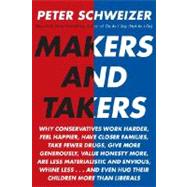
PETER SCHWEIZER is a fellow at the Hoover Institution and the author of several books, including Do As I Say (Not As I Do), Reagan’s War, and The Bushes. He lives in Tallahassee, Florida.
| Why Conservatives and Liberals Are Different | p. 1 |
| The Mighty Me: Or, Why Liberals Are More Self-Centered Than Conservatives | p. 29 |
| Think Globally, Sit on Your Butt Locally: Or, Why Conservatives Are Actually More Generous Than Liberals | p. 55 |
| Liberals and Money: Or, Why Liberals Are More Envious and Less Hardworking Than Conservatives | p. 81 |
| The Whole Truth and Nothing But: Or, Why Conservatives Value Honesty More Than Liberals | p. 105 |
| Anger Management: How Modern Liberalism Promotes Anger | p. 133 |
| Mind Wars: Why Conservatives Actually Know More Than Liberals | p. 157 |
| Whine Country: or, Why Liberals Complain More | p. 183 |
| Conclusion: Why Did I Write This Book? | p. 209 |
| Notes | p. 213 |
| Index | p. 249 |
| Table of Contents provided by Blackwell. All Rights Reserved. |
The New copy of this book will include any supplemental materials advertised. Please check the title of the book to determine if it should include any access cards, study guides, lab manuals, CDs, etc.
The Used, Rental and eBook copies of this book are not guaranteed to include any supplemental materials. Typically, only the book itself is included. This is true even if the title states it includes any access cards, study guides, lab manuals, CDs, etc.
Excerpted from Makers and Takers: Why Conservatives Work Harder, Feel Happier, Have Closer Families, Take Fewer Drugs, Give More Generously, Value Honesty More, Are Less Materialistic and Envious, Whine Less... and Even Hug Their Children More Than Liberals by Peter Schweizer
All rights reserved by the original copyright owners. Excerpts are provided for display purposes only and may not be reproduced, reprinted or distributed without the written permission of the publisher.